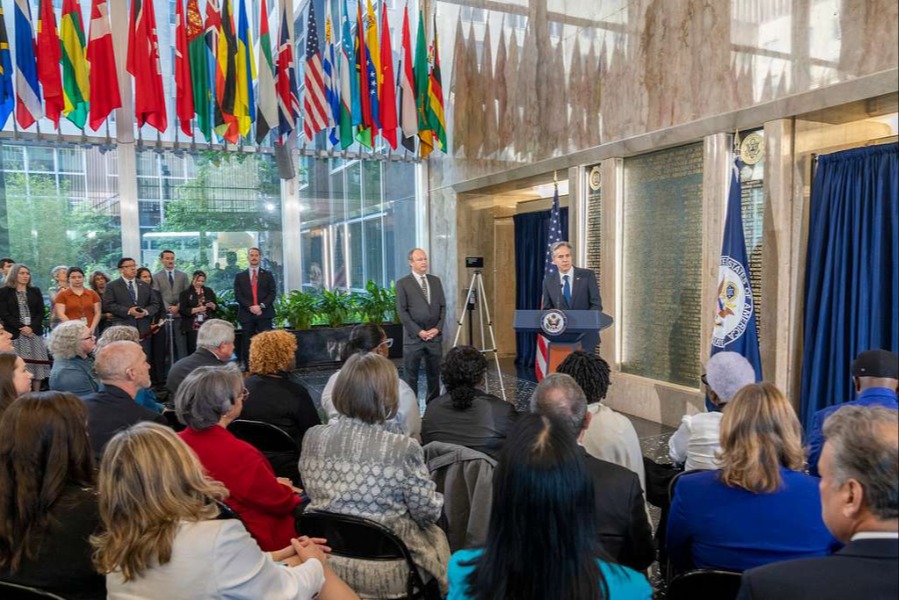Sovereignty on Steroids: International Institutions and the Trump Administration’s “Ideology of Patriotism”
President Donald Trump’s Sept. 25 speech to the U.N. General Assembly surprised few with its condemnation and dismissal of international institutions—from the World Trade Organization, to the U.N. Human Rights Council, to the International Criminal Court.
Published by The Lawfare Institute
in Cooperation With

President Donald Trump’s Sept. 25 speech to the U.N. General Assembly surprised few with its condemnation and dismissal of international institutions—from the World Trade Organization, to the U.N. Human Rights Council, to the International Criminal Court. The speech came two weeks after national security adviser John Bolton’s no-holds-barred attack on the ICC in remarks to the Federalist Society, to which John Bellinger and David Bosco responded critically on Lawfare. During the Sept. 12 episode of Rational Security, Susan Hennessey asked whether the speech was an example of freelancing by Bolton, or whether it represented actual U.S. policy. Trump’s General Assembly speech appears to answer that question.
As Jack Goldsmith has suggested, themes in Trump’s speech—which was reportedly authored primarily by White House aide Stephen Miller—echo those articulated by Bolton in a 1990 Chicago Journal of International Law article titled “Should We Take Global Governance Seriously?” In that article, Bolton exhibits the kind of anti-internationalist fervor that has animated American political discourse at various points in history, and which currently finds its apogee in the rhetoric of certain Trump administration officials. There are serious critiques to be made of the democratic legitimacy and institutional effectiveness of multilateral arrangements, but this shrill hyperbole is as cringeworthy as it is counterproductive if the ultimate goal is to promote the security and prosperity of the United States.
Bolton’s and Trump’s speeches propagate misconceptions about the ICC and about international institutions in general. Their factual distortions and feverish rhetoric undermine, rather than strengthen, substantive criticisms that could be made about how the ICC has operated since it came into existence in 2002. Those countries that responded to Bolton’s remarks with expressions of solidarity with the ICC were likely moved to do so in part by a well-founded concern that Trump’s brand of “America First” politics threatens an array of multilateral efforts that participating countries, including the United States under previous administrations, have deemed to be in their national self-interest. At least in the immediate future, it will fall increasingly to other countries to salvage these efforts, perhaps even in the face of active U.S. opposition.
The ICC in a Nutshell
The International Criminal Court was created by a painstakingly negotiated international treaty, referred to as the Rome Statute, that entered into force on July 1, 2002. The court only has jurisdiction over enumerated crimes committed after that date or the date on which a state becomes a party or voluntarily accepts the court’s jurisdiction, whichever is later (Article 11). The Rome Statute has been signed by 138 countries, and 123 have either ratified or acceded to the statute. The United States participated actively in the Rome negotiations, but it objected to the provision in the final text adopted at the Rome conference that allows the ICC to exercise jurisdiction over nationals of states not party to the statute for conduct that takes place on the territory of a state party.
The Rome Statute endows the ICC with jurisdiction over the international crimes of genocide, crimes against humanity, and war crimes, as well as (on an opt-in basis) the crime of aggression. These crimes are defined in the statute, and their elements are further elaborated in a separate document. The ICC prosecutor is meant to be guided by two core principles built into the statute itself: (1) the principle of complementarity, under which preference is given to investigations and prosecutions by national authorities regardless of their outcomes, as long as they are carried out “genuinely”; and (2) the principle of gravity, under which conduct must meet a threshold level of scale and severity in order to warrant investigation and prosecution before the ICC. The judges of the ICC, who are elected by the state parties, apply these principles to determine the admissibility of cases brought by the Office of the Prosecutor (Article 17).
The principle of consent lies at the heart of the ICC, as it does in any other treaty-based arrangement. That said, there are provisions that, while arguably necessary in order for the ICC to function as intended, have prompted concern from states that seek to remain entirely beyond the ICC’s jurisdictional reach. Notably, although the U.N. Security Council can prevent the prosecutor from commencing or proceeding with an investigation or prosecution for a renewable 12-month period (Article 16), the Security Council does not otherwise control the court, which is a separate and independent body. By ratifying the Rome Statute, states agree to cooperate with the court (Article 86) and consent to the court’s exercise of jurisdiction over genocide, crimes against humanity, and war crimes committed on their territory (Article 12(2)(a)) or by their nationals (Article 12(2)(b)). States that are not parties to the Rome Statute may consent to jurisdiction on an ad-hoc basis (Article 12(3)), and the U.N. Security Council, on which the United States holds a veto, can confer jurisdiction on the court under Chapter VII of the U.N. Charter (Article 13(b)).
The United States has consistently taken the position that the Rome Statute cannot confer jurisdiction on the ICC over conduct by nationals of states that are not party to the statute, even if the conduct occurred on the territory of a state that has consented to the ICC’s jurisdiction. This is a very significant, and very specific, objection. In 2017, when the Assembly of States Parties to the Rome Statute adopted opt-in provisions enabling the ICC to exercise jurisdiction over the crime of aggression, the assembly specified that, absent action by the U.N. Security Council, the ICC cannot exercise jurisdiction regarding a crime of aggression committed “by a national or on the territory” of a state party that has not opted into this regime. While there are reasons for differentiating the legal regime governing the crime of aggression from the other crimes enumerated in the statute, this language presumably offers an example of the type of provision the United States would have liked to see with regard to the other crimes covered by the sStatute.
At the time the Rome Statute was negotiated, some dismissed the United States’ concerns that U.S. actions might become the focus of an ICC investigation as fanciful. However, that is precisely what the Office of the Prosecutor has recently requested a panel of ICC judges to authorize. Over the past decade, the prosecutor has been conducting a preliminary examination of allegations of crimes committed in the context of the armed conflict between pro-government and anti-government forces in Afghanistan, which is a state party to the Rome Statute. As David Bosco previously wrote in Lawfare,
The legal fault line between the United States and the court is relatively straightforward. The ICC maintains that it has jurisdiction over American conduct in Afghanistan because the latter is a member state that has granted the ICC jurisdiction over certain crimes on its territory. The American position, in contrast, has been that the ICC cannot exercise jurisdiction over Americans because the United States has not joined the Rome Statute, the 1998 treaty that created the court.
Perhaps motivated in part by the criticism that the ICC has focused unfairly and disproportionately on African countries, the prosecutor decided to press forward with the request for authorization. The request also includes allegations relating to the conduct of U.S. military personnel and CIA officials on the territory of three states parties to the Rome Statute (Lithuania, Poland and Romania) on the grounds that this alleged conduct has a connection to the conflict in Afghanistan. This has set the ICC and the United States on an actual—rather than just a hypothetical—collision course.
The Bolton Critique
The United States’s critique of the ICC’s jurisdictional provisions has spanned both Republican and Democratic administrations. The Clinton administration signed the statute on Dec. 31, 2000, arguably committing the United States to refrain from taking actions that would defeat the treaty’s “object and purpose.” But in 2002, John Bolton—in his capacity as undersecretary of state for arms control and international security—sent a letter to U.N. Secretary-General Kofi Annan indicating that “the United States does not intend to become a party to the treaty” and that “[a]ccordingly, the United States has no legal obligations arising from its signature.” Congress, for its part, enacted the American Servicemembers’ Protection Act of 2002—sometimes referred to as the “Hague Invasion Act”—which indicates categorically that the United States “will not recognize the jurisdiction of the International Criminal Court over United States nationals” based on the “fundamental principle of international law that a treaty is binding upon its parties only and that it does not create obligations for nonparties without their consent to be bound.”
The validity of the ICC’s jurisdictional regime as a matter of international law has been debated at length. Yet Bolton went a step further in his Federalist Society remarks earlier this September, claiming that “the ICC is an unprecedented effort to vest power in a supranational body without the consent of either nation-states or the individuals over which it purports to exercise jurisdiction,” even though individual consent generally does not feature in discussions of treaty ratification because treaties are agreements between States. He warned that “[t]he next obvious step” for the ICC will be “to claim complete, universal jurisdiction: the ability to prosecute anyone, anywhere for the vague crimes identified by The Hague’s bureaucrats.” Indeed, given the Trump administration’s heated rhetoric, some might be led to believe—contrary to fact—that this is precisely what the ICC already does.
The U.N. General Assembly Speech
Trump’s categorical rejection of the ICC during his General Assembly speech formed part of his broader attempt to dismantle the premises that underlie what has been called the “liberal international order.” His remarks put a decidedly particularist spin on the universalist rhetoric of past administrations, which I have written about elsewhere. Under Trump’s international political theory—if we can call it that—other countries might be the incidental beneficiaries of U.S. actions, but the ultimate focus of the United States is intra-national, not inter-national. In his assessment, “[t]his is great news for our citizens and for peace-loving people everywhere.” That is because “when nations respect the rights of their neighbors and defend the interests of their people, they can better work together to secure the blessings of safety, prosperity, and peace.”
Trump’s vision of the American “people” represents an ugly version of exclusionary nationalism whose resurgence we have also seen in other countries. This is quintessential Romantic nationalism, whereby, according to Trump, each country’s representative “is the emissary of a distinct culture, a rich history, and a people bound together by ties of memory, tradition, and the values that make our homelands like nowhere else on Earth.” Under this view, “[h]umanity is better because of this beautiful constellation of nations, each very special, each very unique, each shining brightly in its part of the world. In each one, we see also promise of a people bound together by a shared past and working toward a common future.” In Trump’s account, this national distinctiveness (and, implicitly, homogeneity) “is why America will always choose independence and cooperation over global governance, control, and domination.” That said, it remains unclear what types of “cooperation” Trump would see as being compatible with his emphasis on “independence.” After all, the fundamental principle underlying treaty law (and contract law, for that matter) is pacta sunt servanda—“agreements must be kept.”
In Trump’s instrumentalist vision, the very idea of an international community is, quite literally, incoherent. Instead, international relations devolves into a series of transient quid pro quos. Trump proclaimed that the United States will “not tell you how to live or work or worship,” and that “[w]e only ask that you honor our sovereignty in return.” Although it is difficult to reconcile this pledge with certain actions taken by the Trump administration, the underlying message is clear: Stay out of our business. Yet international human-rights law, which is also primarily treaty-based, takes the position that the fundamental dignity of human beings presents a matter of inclusive international concern. Although difficult questions arise about the extent to which states should be able to invoke a “margin of appreciation” to insulate their particular interpretations of the protections owed to individuals from international scrutiny, Trump’s rhetoric sends the message to the authoritarians he unabashedly admires: We’ll turn a blind eye to your abuses, and we expect the same in return.
In the context of international criminal law, one of the foundational principles established at Nuremberg is that lawfulness under internal (domestic) law does not absolve a state official from responsibility for violating the agreed-upon rules of international law. This brings us back to the ICC. For those who missed the Bolton speech, or who thought Bolton was freelancing, Trump reaffirmed in his remarks that “the United States will provide no support and recognition for the International Criminal Court. As far as we are concerned the ICC has no legitimacy or authority.” Not content to push back against the ICC’s potential assertion of jurisdiction over the conduct of U.S. troops on the territory of states parties to the Rome Statute, Trump’s speech embraced Bolton’s scorched-earth approach to the entire institution and perpetuated similar misconceptions about the ICC’s reach. He continued:
The ICC claims near universal jurisdiction over the citizens of every country, violating all principles of justice, fairness and due process. We will never surrender America’s sovereignty to an unelected, unaccountable body. America is governed by Americans. We reject the ideology of globalism and accept the ideology of patriotism.
There are reasons to question whether the ICC is capable of fulfilling the aspirations of the countries who gathered in Rome in the summer of 1998. The international criminal-justice project should not be embraced unquestioningly, but nor should it be discarded entirely simply because certain members of the Trump administration refuse to be on the receiving end of any scrutiny whatsoever. (While the sovereigntist objection relates to international scrutiny, high-ranking members of this administration do not seem particularly amenable to domestic scrutiny either.)
Before “globalism” was appropriated as an anti-Jewish slur, Bolton argued in his 1990 article that the ideology belongs to an elite minority of “law and international relations professors” who are “uneasy” with the “dominance of capitalism as an economic philosophy and individualism as a political philosophy.” According to Bolton, the “overwhelmingly predominant” view, with which Bolton associates himself, is instead that of “Americanists,” who reject external constraints and prefer, for example, “the old-fashioned, balance-of-power way” of regulating the use of force. The possibility that an international court could authorize an investigation that would encompass the conduct of U.S. nationals provides the perfect foil for a president who takes pride in flouting the conventions of the presidency—and who perceives the United States’ actions in the world over the past half-century as manifestations of weakness and gullibility.
There are many reasons why the rhetorical opposition between “globalists” and “patriots” has resonated with U.S. voters. Yet one can consider oneself to be both a globalist and a patriot, and it is not a contradiction to believe that U.S. national interests are promoted most effectively by assuming a leadership role and building durable, rather than merely expedient, alliances. On the narrower question of how to deal with the ICC, as with many other issues, the United States would be better served by clear-eyed analysis of the trade-offs at stake. Unfortunately, if these two speeches are any indication, that is the last thing Americans can expect to hear from this administration.





